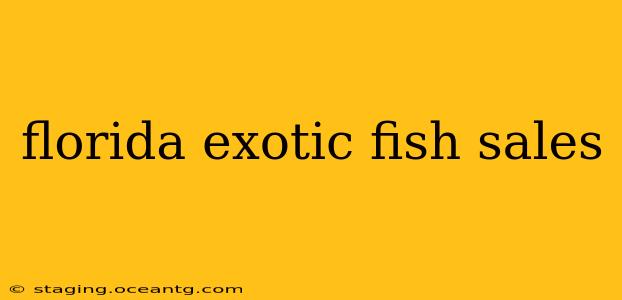Florida's warm climate and abundant waterways make it a haven for exotic fish enthusiasts. However, the sale and ownership of exotic fish in Florida are subject to strict regulations designed to protect the state's native ecosystems from invasive species. This guide explores the legal aspects, responsible ownership, and ethical considerations surrounding the sale and purchase of exotic fish in the Sunshine State.
What Exotic Fish Can Be Legally Sold in Florida?
Florida's Fish and Wildlife Conservation Commission (FWC) maintains a list of prohibited and regulated species. Many popular aquarium fish are readily available, but it’s crucial to verify their legality before purchasing. Some species may require permits, while others are completely banned. The FWC website is the definitive resource for this information. Always check the current regulations before buying any exotic fish in Florida, as these lists are subject to change. Ignoring these regulations can lead to significant fines.
Where Can I Buy Exotic Fish in Florida?
Exotic fish are often sold at various locations throughout the state. These include:
- Specialty Fish Stores: These stores usually carry a wider variety of exotic fish and often have knowledgeable staff who can advise on care and maintenance.
- Online Retailers: While convenient, buying online requires extra caution to ensure the seller is reputable and the fish arrive healthy and legally. Check reviews carefully.
- Private Breeders: These breeders sometimes offer rare or unique species, but due diligence is essential to ensure they operate legally and ethically.
It's crucial to thoroughly research any potential seller before making a purchase, ensuring they comply with all relevant Florida laws and regulations.
Are There Permits Required for Selling or Owning Exotic Fish in Florida?
Yes, depending on the species, permits may be required for both sale and ownership. Some species require specific permits, while others might fall under broader regulations. Failing to obtain the necessary permits can result in hefty fines and legal repercussions. The FWC website provides comprehensive details on permitting requirements, and contacting them directly is highly recommended for clarification.
What Happens if I Sell or Own Illegal Exotic Fish in Florida?
Selling or owning prohibited exotic fish in Florida can result in significant penalties, including substantial fines and even criminal charges. The severity of the punishment depends on the species involved and the nature of the violation. The FWC actively enforces these regulations, and ignorance of the law is not a valid defense.
What Are the Ethical Considerations of Owning Exotic Fish?
Beyond legal compliance, ethical considerations are crucial. Responsible fish ownership includes:
- Research: Thoroughly research the specific needs of any fish before purchasing it. This includes understanding its habitat requirements, dietary needs, and potential for growth.
- Proper Housing: Ensure you can provide an appropriate and spacious aquarium with the correct water parameters and filtration.
- Long-Term Commitment: Exotic fish can live for many years, so be prepared for a long-term commitment to their care.
- Preventing Escapes: Take precautions to prevent accidental escapes, which could introduce invasive species into Florida's waterways.
How Can I Identify Potentially Invasive Exotic Fish Species?
Identifying potentially invasive species requires knowledge of local flora and fauna and understanding the characteristics of species known to be invasive elsewhere. The FWC website provides resources to help identify potentially harmful species. If you encounter a fish you suspect is invasive, report it to the FWC immediately.
This guide serves as an overview. Always consult the Florida Fish and Wildlife Conservation Commission (FWC) for the most up-to-date and accurate information regarding the sale and ownership of exotic fish within the state. Responsible ownership and adherence to regulations are vital for protecting Florida's unique aquatic environment.
